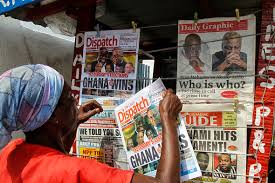The assurance of the Chairman of the Authority of Heads of State and Government of the Economic Community of West African States (ECOWAS) to the Government and the People of Burkina Faso of the commitment of the regional body to help win the fight against terrorism and violent extremism is one of the leading stories in the Ghanaian press on Thursday.
The Graphic reports that the Chairman of the Authority of Heads of State and Government of the Economic Community Burkina Faso, oof West African States (ECOWAS), President Nana Addo Dankwa Akufo-Addo, has assured the government and the people of Burkina Faso of the commitment of the regional body to help win the fight against terrorism and violent extremism.
Commiserating with President Roch Marc Christian Kabore of Burkina Faso in Ouagadougou yesterday following the killing of 160 people in that country by yet-to-be-identified militants on Sunday, June 6, 2021, President Akufo-Addo said the scourge of terrorism must be defeated in West Africa for citizens to live in peace, freedom, progress and prosperity.
He, however, said the fight against terrorism must be a collective effort, for which reason it was incumbent on ECOWAS to pool together and assist countries such as Burkina Faso, Niger and Mali that were at the frontline of the battle against terrorism and violent extremism to win the fight.
With the next ECOWAS Summit scheduled to be held in Accra on June 19, 2021, the Chairman said top on the agenda of the meeting of Heads of State would not only include reform of the organisation but also a firm resolution by member states to implement a comprehensive plan of action to effectively combat the menace of terrorism.
President Akufo-Addo further expressed the determination and commitment of Ghana to deepen and strengthen the ties of friendship and cooperation with Burkina Faso in areas such as infrastructure, railways development and agriculture for the mutual benefit of their respective peoples.
The newspaper says that Ghana has asked the International Finance Corporation (IFC) to increase the funding it offers private enterprises in Ghana from the current $5 million to between $15 million and $20 million per business.
The Minister of Finance, Mr. Ken Ofori-Atta, who made the call, also asked the corporation to raise the level of investment committed into core sectors of the economy, such as manufacturing, agribusiness, financial markets and housing.
The minister made the call in Accra yesterday when he opened a two-day strategy retreat between the government and the IFC, a member of the World Bank Group (WBG) with focus on funding private enterprises.
The retreat will enable the government and the IFC to look at ways to align the government’s post-COVID-19 response plan with the IFC’s country strategy.
M.r Ofori-Atta said the increment in the amount invested per firm was needed to raise critical enterprises to drive sustained transformation in the economy.
He said the devastating effects of the COVID-19 on the local economy required that global bodies, such as the IFC, refocus their support to help revive the economy and protect livelihoods.
Given that key sectors, such as manufacturing, housing and agribusiness, had the potential to increase exports and expand job creation, the minister said, increased investments in enterprises operating in such sectors would help accelerate economic growth and development.
Mr. Ofori-Atta noted that the fallouts from the pandemic had opened an era of profound urgency for economic transformation in Ghana, and that Ghana now needed to readjust to be able to confront the uncertain times.
The Graphic also reports that the Ghana COCOBOD has been urged to introduce alternative cash ‘intercrops’ in order to accrue over $5.0 billion annually.
According to the Chamber for District and Community Industry, this would drastically improve the country’s Gross Domestic Product (GDP), help improve the value of the cedi for a longer period, boost the processing industry while creating between 80,000 and 100,000 direct jobs and over 400,000 indirect jobs.
“The cocoa sector, for many years, has become the backbone or support for our exchange rate stability. The government, through COCOBOD every year, issues a syndicated loan between $1billion and $1.5billion, purposely for the forward sale of cocoa for a particular crop season. This has curbed the seasonal sharp depreciation of the cedi, improved our balance of payment as well as the reserve position of the country.”
“Unfortunately, more than half of the producers of cocoa live below the poverty line, with a monthly wage of less than GH¢150 or $400 per acre for a year compared to other cash crops. This has enticed the cocoa farmers to easily give out their coca farmlands for illegal mining in the country, as this provides non sustainable cash up-front to these farmers,” a statement issued by the Chamber for District and Community Industry (CDCI) and signed by its Convenor, Solomon Kattah, said.
“The government of Ghana is aware that the economic and social development of the country depends on improving the living and working conditions of producers for which per our Living Income Differential (LID) introduced by the government is a step in the right direction. But the yield per hectare age is woefully inadequate”, the statement said.
Furthermore, it said “COCOBOD with its large farmer data base and hectare age in the cocoa sector can introduce alternative cash ‘intercrops’ which has improved the farmer income to about 500 per cent. It has also increased net earnings above $5billion.”
The statement also urged COCOBOD and the government to consider those key
GIK/APA


